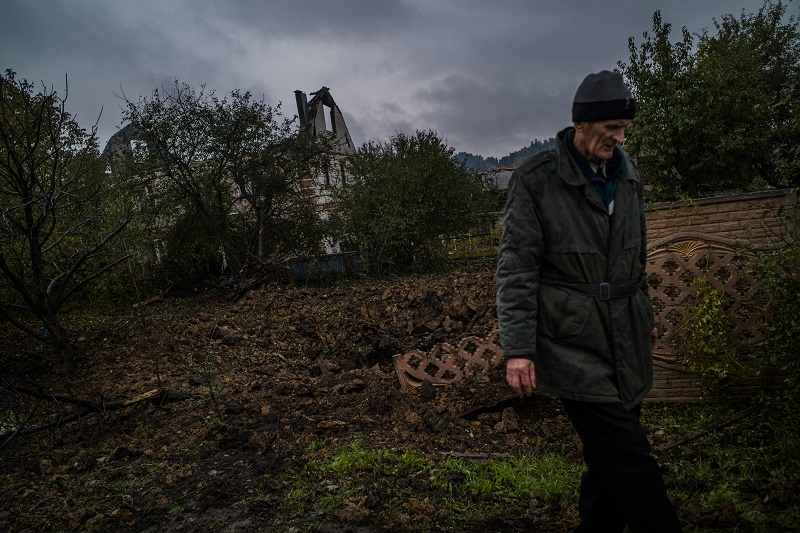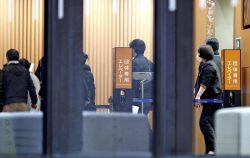
A man walks in front of civilian houses destroyed in a rocket strike in Kupiansk, Ukraine, on Oct. 10
12:06 JST, October 16, 2022
LONDON – Russia’s efforts to counter Ukrainian advances by pounding Kyiv and other cities with missiles and mobilizing hundreds of thousands of reservists represent a significant escalation in the seven-month old war, but are unlikely to shift the dynamics of a conflict now clearly tilting in favor of Ukraine, Western intelligence assessments and military experts say.
The missile strikes alone have little strategic value, although they are inflicting widespread human misery and have disrupted lives in cities that have been relatively untouched by the fighting, the assessments say.
Since the onslaught began on Monday over three dozen people have been killed and scores more wounded. Ukraine’s electricity infrastructure appears to be the main target, meaning that some residential areas have been plunged into darkness, leaving civilians confronting the possibility of facing winter without power.
But conditions on the battlefield continue to favor the nimbler, more highly motivated and better armed Ukrainian military, which seems likely to retain the advantage over Russia’s lumbering, poorly equipped and exhausted army, at least for the foreseeable future.
U.S. and other Western officials predict that Ukraine will remain on the counteroffensive well into the coming months, even as the weather forces the pace of the war to slow.
“I expect that Ukraine will continue to do everything it can throughout the winter to regain its territory and to be effective on the battlefield,” U.S. Defense Secretary Lloyd Austin told reporters in Brussels this week. “Most recently we’ve seen them be very effective both in the east and down in the south as they’ve taken back quite a bit of territory from the Russians.”
The tempo of the fight has already slowed in recent days as Ukraine consolidates the positions it has recently won. Russia has made some incremental gains, seizing some villages near the eastern Donbas town of Bakhmut, which the Russians have been trying to capture since July. Ukraine has captured several more settlements in the southern province of Kherson, where it has made steady advances in recent weeks.
The pace will slow further as winter brings snow and ice in the east and mud in the south to the terrain on which most of the recent battles have been fought, military experts say. At some point in the months ahead, the weather may force Ukraine to halt its advances, said a Western official who spoke on the condition of anonymity to discuss sensitive subjects. But for now, “the Ukrainians maintain the initiative and the momentum,” he said.
No longer, however, is there an expectation that Russia will be in a position to seize significantly more ground. So dramatically has Ukraine turned the fight around that the only outstanding question is how much more territory Ukraine will be able to take back – not whether Russia will be able to achieve its goals, said Rob Lee of the Philadelphia-based Foreign Policy Research Institute.
Ukraine’s army, which was heavily outgunned by Russia at the start of the war, now outclasses the Russian military by almost every measure, he said, from the sophisticated Western artillery systems it is using to pinpoint Russian targets far from the front lines to the availability and quality of the soldiers it can bring to the fight.
Russia continues to suffer heavy losses of its forces and equipment and is digging into defensive positions while Ukraine is steadily receiving supplies of new and technologically advanced weaponry from its Western allies. U.S. intelligence assessments say Russia has lost 6,000 tanks, armored vehicles and other military equipment during the course of the war, and some of those are being captured intact by the Ukrainians, further replenishing their arsenal.
“Ukraine has the advantage and Russia is struggling to match those advantages. As long as Ukraine keeps getting NATO support and keeps getting supplied with artillery, Ukraine should keep having successes,” Lee said.
Whether the influx of up to 300,000 freshly mobilized Russian soldiers will serve to blunt Ukrainian advances is harder to predict, said Konrad Muzyka, director of the Poland-based Rochan defense consultancy.
Ukrainian officials say that they have not noticed any discernible impact from those that have already shown up on the front lines, put at 16,000 by President Vladimir Putin on Friday. But they don’t discount the possibility that a huge influx of troops could complicate Ukraine’s hopes of progress, said Yuriy Saks, an adviser at Ukraine’s defense ministry.
“We don’t want to underestimate our enemy and we understand that if 200,000 arrive on the battlefield things could change,” he said.
There are, however, doubts about Russia’s capacity to adequately train and equip such a large number of inexperienced troops, the Western official said. The ones that have shown up so far “have been fielded with very, very limited training and very, very poor equipment,” he said. “It’s really unlikely they will have any positive impact in the near term.”
Even the onset of winter can be expected to favor Ukraine, said a Ukrainian government defense adviser who spoke on the condition of anonymity because he isn’t authorized to speak to the news media. Russia is struggling to provide sleeping bags and other winter gear for all its soldiers, while Ukraine’s cold-weather allies such as Canada, Estonia and Lithuania are contributing tens of thousands of winter uniforms, he said.
Mobilizing tens of thousands of inexperienced and ill-equipped soldiers into a harsh winter environment such as Ukraine’s, where temperatures routinely plunge well below freezing, could lead to deepening demoralization among forcibly recruited soldiers, the adviser said. Moreover, Russia also needs experienced and capable officers and commanders to lead the new men, but its existing leadership ranks have already suffered heavy casualties and are worn down from months of fighting, he said.
Russia appears to be hoping that by flooding the battlefield with tens of thousands of new men it can use “a human wave” to blunt Ukraine’s advances, almost certainly suffering huge casualties in the process, the adviser said. But although Ukraine has the reserve forces to match Russia’s deployments, it is determined not to be drawn into fighting pitched, bloody battles with the Russians. Rather, Ukraine is hoping to continue to outsmart the Russians, by focusing on hitting their command posts, key equipment and supply lines.
“Russia is hoping to get some victories through numerical superiority,” the adviser said. “If we want to win this war we should be thinking about technological superiority. It shouldn’t be an infantry-to-infantry, Soviet way of fighting.
“We are ready to fight to the end, but at the same time we shouldn’t play this game, according to the Russian vision, in which soldiers’ lives don’t matter,” he added.
Russia’s capacity to sustain the missile strikes is expected to dwindle, further constraining its options on the battlefield, Western officials and military experts say. In particular, Russia is believed to be running low on the precision-guided missiles that can be used to target key sites. The Ukrainian Defense Ministry said Friday that Russia began the war with 1,844 precision guided missiles – including sea-launched Kalibr missiles, ground-launched Iskanders and air-launched Kh-101s and Kh-555s – of which only 609 remain. Western officials said the numbers are in line with their estimates.
Russia does still have sizable stocks of unguided missiles that it can use to hit cities, without precision, and it is likely to continue to use them in an attempt to demoralize the Ukrainian population, the government adviser said.
But as long as the strikes are hitting civilians and civilian infrastructure rather than core military targets, “they are not going to turn the tide in this war,” said Muzyka.
Top Articles in News Services
-

Survey Shows False Election Info Perceived as True
-

Prudential Life Expected to Face Inspection over Fraud
-

Hong Kong Ex-Publisher Jimmy Lai’s Sentence Raises International Outcry as China Defends It
-

Japan’s Nikkei Stock Average Touches 58,000 as Yen, Jgbs Rally on Election Fallout (UPDATE 1)
-

Japan’s Nikkei Stock Average Falls as US-Iran Tensions Unsettle Investors (UPDATE 1)
JN ACCESS RANKING
-

Japan PM Takaichi’s Cabinet Resigns en Masse
-

Japan Institute to Use Domestic Commercial Optical Lattice Clock to Set Japan Standard Time
-

Israeli Ambassador to Japan Speaks about Japan’s Role in the Reconstruction of Gaza
-

Man Infected with Measles Reportedly Dined at Restaurant in Tokyo Station
-

Videos Plagiarized, Reposted with False Subtitles Claiming ‘Ryukyu Belongs to China’; Anti-China False Information Also Posted in Japan
























